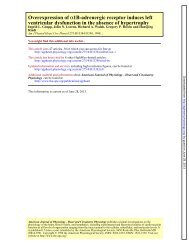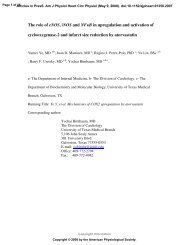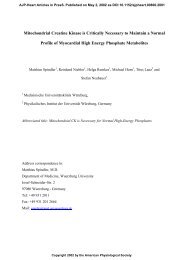1 Mariannick Marcil, Karine Bourduas, Alexis Ascah, Yan Burelle ...
1 Mariannick Marcil, Karine Bourduas, Alexis Ascah, Yan Burelle ...
1 Mariannick Marcil, Karine Bourduas, Alexis Ascah, Yan Burelle ...
Create successful ePaper yourself
Turn your PDF publications into a flip-book with our unique Google optimized e-Paper software.
ABSTRACT<br />
The purpose of this study was to determine if regular exercise (treadmill running, 10 weeks)<br />
alters the susceptibility of rat isolated heart mitochondria to Ca 2+ -induced PTP opening and if this<br />
could be associated with changes in the modulation of PTP opening by selected physiological<br />
effectors. Basal leak-driven and ADP-stimulated respiration in the presence of substrates for<br />
complex I, II and IV were not affected by training. Fluorimetric studies revealed that in the control<br />
(C) and exercise-trained (T) groups, the amount of Ca 2+ required to trigger PTP opening was<br />
greater in the presence of complex II vs I substrates (230 ± 12 vs 134 ± 7 nmol Ca 2+ .mg prot. -1<br />
respectively, P < 0.01, pooled average of C and T groups). In addition, with a substrate feeding<br />
the complex II, training increased by 45 % (P < 0.01) the amount of Ca 2+ required to trigger PTP<br />
opening, both in the presence and absence of the PTP inhibitor cyclosporin A. However, ,<br />
ROS production, NAD(P)H ratio and Ca 2+ uptake kinetics were not different in mitochondria from<br />
both groups. Taken together, these results suggest the existence of a substrate-specific<br />
regulation of the PTP in heart mitochondria and that regular exercise results in a reduced<br />
sensitivity to Ca 2+ -induced PTP opening in presence of complex II substrates.<br />
Key words: Exercise, heart, mitochondrial function, Ca 2+ stress<br />
2






